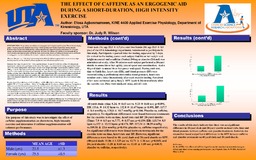| dc.description.abstract | INTRODUCTION: Many athlete use caffeine as an ergogenic aid to improve performance. The world anti doping agency (WADA) currently monitors the pattern caffeine is being used during competition among athletes. Evidence from the literature indicates that caffeine ingestion may improve exercise performance by reducing fatigue and increasing concentration and alertness. However, the evidence for caffeine as an ergogenic aid on short-duration and high-intensity activity has been controversial. These conflicting conclusions can be attributed to testing protocol, dose of caffeine, fitness level of subjects, nutrition and subject collaboration.
Purpose: The purpose of this study is to investigate the effect of caffeine supplementation on short-term, high-intensity exercise and determine if caffeine supplementation will enhance performance.
Methods: Four men (M; age 23.5 ±1.3 yrs.) and two women (M; age 25.5 ±0.5 yrs.) of the UTA Kinesiology department, volunteered to participate in this study. Participants reported twice for testing, separated by 3 days. On arrival to the testing center, each subject had his or her weight and height measured and a caffeine (Nodoz) 200mg or placebo (Tylenol) was administered orally. After 30 minutes each subject performed a 20-yard shuttle to assess his or her agility, lateral speed and coordination. And a 40-yard dash to assess his or her power and speed. During each test, time to finish line, heart rate (HR), and blood pressure (BP) were recorded using a professional electronica blood pressure, heart rate monitor and a timer immediately after each exercise testing. Perceived effort were estimated using Borg’s RPE (scale 6-20) immediately after the exercise test. Data were analyzed using paired t-test.
Results: (time 5.24, ±0.63 sec vs. 5.23 ±0.60 sec; p=0.891, HR 133.6, ±14.32 bpm vs. 132.8 ±11.67 bpm; p=0.891, BP: 117.7 ±8.4 mmHg vs. 128.0 ±10.7 mmHg; p=0.106. Placebo vs. caffeine, respective). No significant differences were found between treatments for the exercise tests on time, heart rate and BP. 20-yard shuttle: (Time: 7.9 ±0.5 sec vs.7.77, ±0.57 sec; p=0.159; HR: 115.7±8.5 bpm vs.122 ±13.22 bpm; p=0.174, BP: 117.24 ±10.29 mmHg vs.109.56 ±23.6 mmHg; p=0.416; placebo vs. caffeine respectively). No significant differences were found between treatments for the exercise tests on time, heart rate and BP. However, significant differences were found in 40-yard dash and 20-yard shuttle on RPE (40-yard dash: 11.86 ±1.125 sec vs. 12.71 ±1.16 sec; p=0.045; and 20-yard shuttle: 11.28 ±0.69 sec vs. 12.43 ±1.05 sec; p=0.015; placebo vs. caffeine, respectively).
Conclusion: The results of this study indicate that there was no significant difference in 40-yard dash and 20-yard shuttle on heart rate, time and blood pressure between caffeine and placebo treatment. However, the researcher found a significant difference in the RPE between caffeine and placebo treatments. | en_US |

